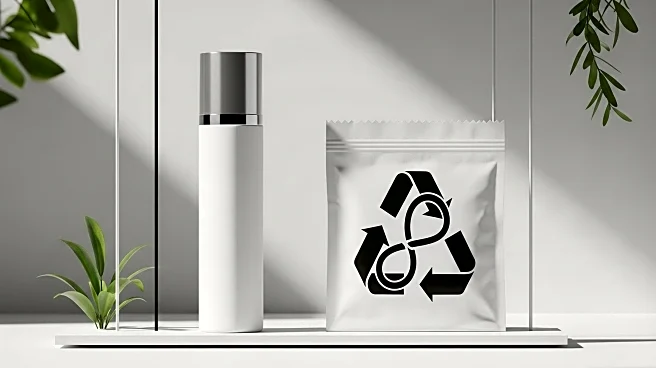What is the story about?
What's Happening?
The U.S. cosmetic packaging industry is experiencing significant shifts due to global tariff pressures and increasing sustainability mandates. Companies are increasingly turning to domestic manufacturing to mitigate the impact of tariffs and to comply with new sustainability standards, such as the European Union's impending ban on single-use plastics by 2030. This shift is driven by the need for speed to market and the ability to quickly adapt to consumer demands, often influenced by social media trends. Domestic suppliers are focusing on diversification and innovation to maintain competitiveness, with many investing in sustainable packaging solutions like Eco Smart containers and post-consumer recycled materials. The Federal Trade Commission's emphasis on 'Made in USA' labeling further highlights the importance of domestic production in the current economic climate.
Why It's Important?
The move towards domestic manufacturing in the cosmetic packaging industry is crucial for several reasons. It helps companies avoid the financial strain of tariffs, which can increase costs by up to 25% for imported components. Additionally, domestic production supports sustainability goals by reducing transportation emissions and enabling quicker adaptation to new environmental regulations. This trend also enhances supply chain resilience, allowing brands to respond swiftly to market changes and consumer preferences. As sustainability becomes a key focus for consumers, companies that invest in eco-friendly packaging solutions stand to gain a competitive edge. The emphasis on 'Made in USA' labeling not only boosts consumer trust but also aligns with broader economic policies favoring domestic production.
What's Next?
As the demand for sustainable and locally sourced packaging grows, U.S. companies are likely to continue investing in domestic manufacturing capabilities. This includes expanding facilities and enhancing technological capabilities to meet the evolving needs of the beauty industry. The focus will be on creating packaging solutions that are not only environmentally friendly but also cost-effective and efficient. Companies may also explore partnerships and collaborations to further strengthen their supply chains and reduce reliance on overseas suppliers. The ongoing development of Extended Producer Responsibility laws will likely drive further innovation in sustainable packaging, pushing brands to adopt more eco-conscious practices.
Beyond the Headlines
The shift towards domestic manufacturing and sustainable packaging in the cosmetic industry reflects broader economic and environmental trends. It highlights the growing importance of supply chain resilience and the need for companies to adapt to changing consumer expectations. This movement also underscores the potential for domestic production to contribute to economic growth and job creation in the U.S. As companies navigate the complexities of 'Made in USA' claims, there is an opportunity to redefine what it means to be a sustainable and responsible brand in the modern marketplace.















